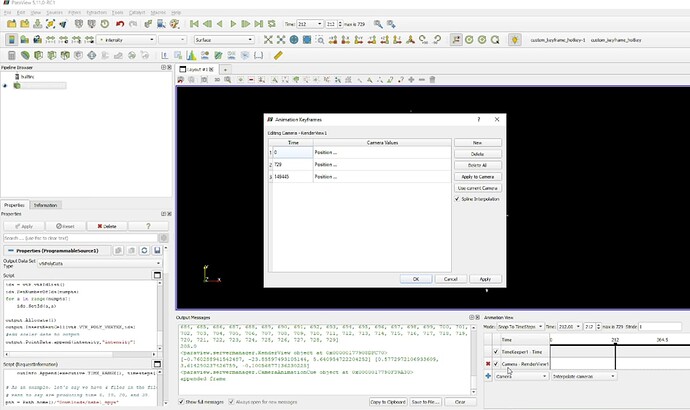I haven’t been able to figure out whether this issue is the same thing as what I’m experiencing I am having issues with the clipping animation track KeyTime values?
I’m building a macro to make it easier to generate interpolated camera keyframes for my animations. I have an issue where in a simple scene with a cone geometry my macro works correctly and assigns the camera’s information to the keyframe time that is selected in the animation viewer. See the ~40 sec video link here
cone success
But when I use my actual with a programmable source the exact same behavior yields a time value that is wildly off from the value the animation player shows under the play head. Here’s my other video showing the error
programmable source fail
To summarize in a single image I would have expected the time value in the third row to match 205 not 149445
Where the 149445 is creeping in is really unclear to me.
Here are the scripts that are involved
macro
from paraview.simple import *
kf = CameraKeyFrame()
anim = GetAnimationScene()
kf.KeyTime = anim.AnimationTime
print(kf.KeyTime)
rv = GetActiveViewOrCreate("RenderView")
print(rv)
campos = rv.CameraPosition
camfoc = rv.CameraFocalPoint
up = rv.CameraViewUp
kf.Position = campos
kf.FocalPoint = camfoc
kf.ViewUp =up
print(campos,camfoc)
pscale = rv.CameraParallelScale
# typically the camera will have been added after the default one
# todo figure out a better way to select by name Camera
cue = anim.Cues[1]
print(cue)
cue.KeyFrames.append(kf)
print("appended frame")
programmable source script
def GetUpdateTimestep(algorithm):
"""Returns the requested time value, or None if not present"""
executive = algorithm.GetExecutive()
outInfo = executive.GetOutputInformation(0)
return outInfo.Get(executive.UPDATE_TIME_STEP()) \
if outInfo.Has(executive.UPDATE_TIME_STEP()) else None
# This is the requested time-step. This may not be exactly equal to the
# timesteps published in RequestInformation(). Your code must handle that
# correctly.
req_time = GetUpdateTimestep(self)
#print(req_time)
from pathlib import Path
import numpy as np
from vtk.numpy_interface import algorithms as algs
from vtk.numpy_interface import dataset_adapter as dsa
pth = Path.home()/"Downloads/lidar_data"
npy_pcls = list(Path(pth).rglob("*.npy"))
npy_pcl = [npy for npy in npy_pcls if req_time == float(f"{npy.stem}")][0]
all_data = np.load(npy_pcl)
data = all_data[:,:3]
intensity = all_data[:,3]
#print(data)
# make vtk points
pts = vtk.vtkPoints()
pts.SetData(dsa.numpyTovtkDataArray(data,"Points"))
output.SetPoints(pts)
#make single cell
numpts = pts.GetNumberOfPoints()
ids = vtk.vtkIdList()
ids.SetNumberOfIds(numpts)
for a in range(numpts):
ids.SetId(a,a)
output.Allocate(1)
output.InsertNextCell(vtk.VTK_POLY_VERTEX,ids)
#add scalar data to output
output.PointData.append(intensity,"intensity")
request info script
# Code for 'RequestInformation Script'.
from pathlib import Path
def setOutputTimesteps(algorithm, timesteps):
"helper routine to set timestep information"
executive = algorithm.GetExecutive()
outInfo = executive.GetOutputInformation(0)
outInfo.Remove(executive.TIME_STEPS())
for timestep in timesteps:
outInfo.Append(executive.TIME_STEPS(), timestep)
outInfo.Remove(executive.TIME_RANGE())
outInfo.Append(executive.TIME_RANGE(), timesteps[0])
outInfo.Append(executive.TIME_RANGE(), timesteps[-1])
# As an example, let's say we have 4 files in the file series that we
# want to say are producing time 0, 10, 20, and 30.
pth = Path.home()/"Downloads/lidar_data"
npy_pcls = list(Path(pth).rglob("*.npy"))
times = [float(f.stem) for f in npy_pcls]
print("times are",times)
setOutputTimesteps(self, times)
i’ve narrowed down the issue to a a python state file that others can try also.
debugging_macro.py (5.7 KB)
